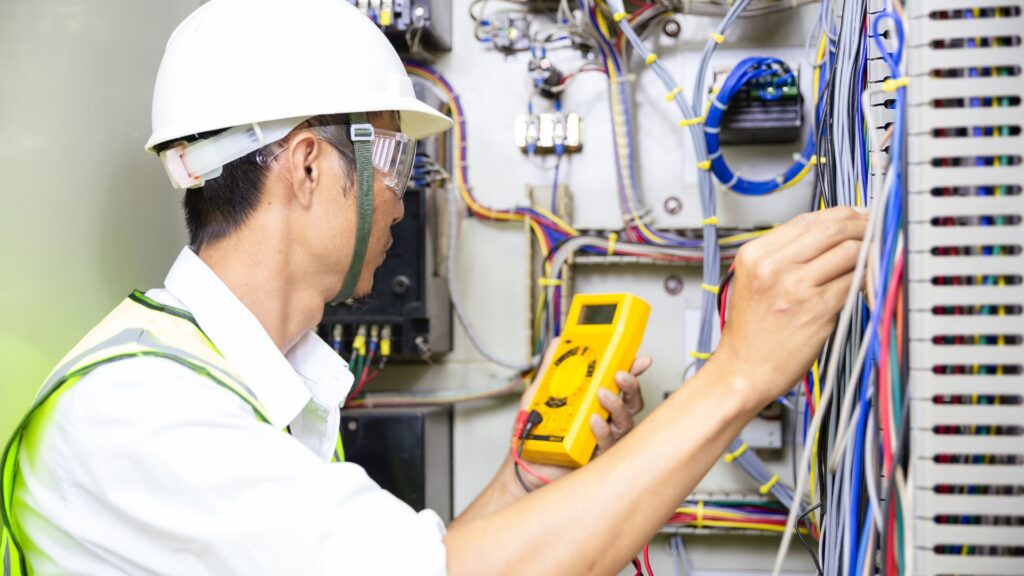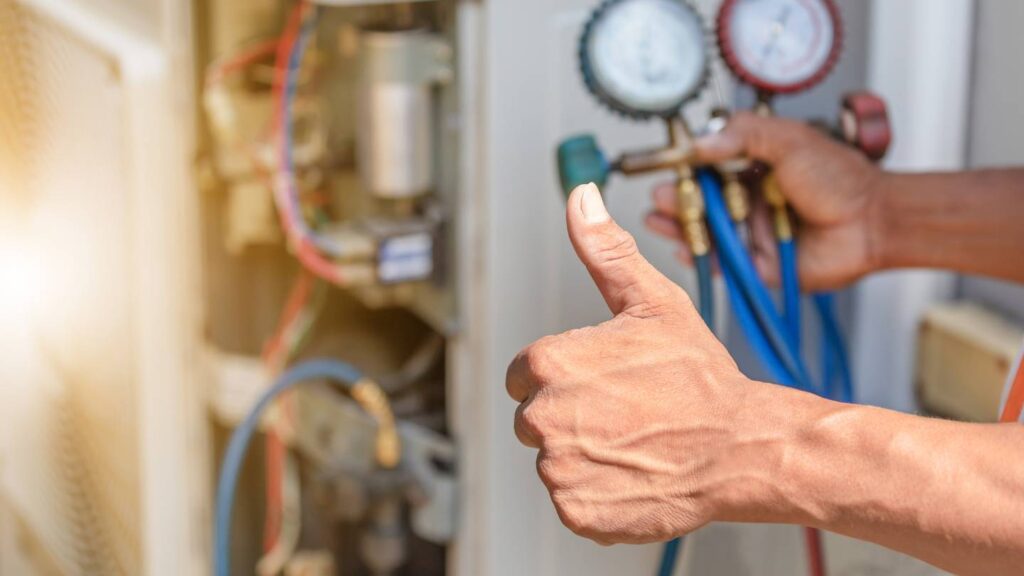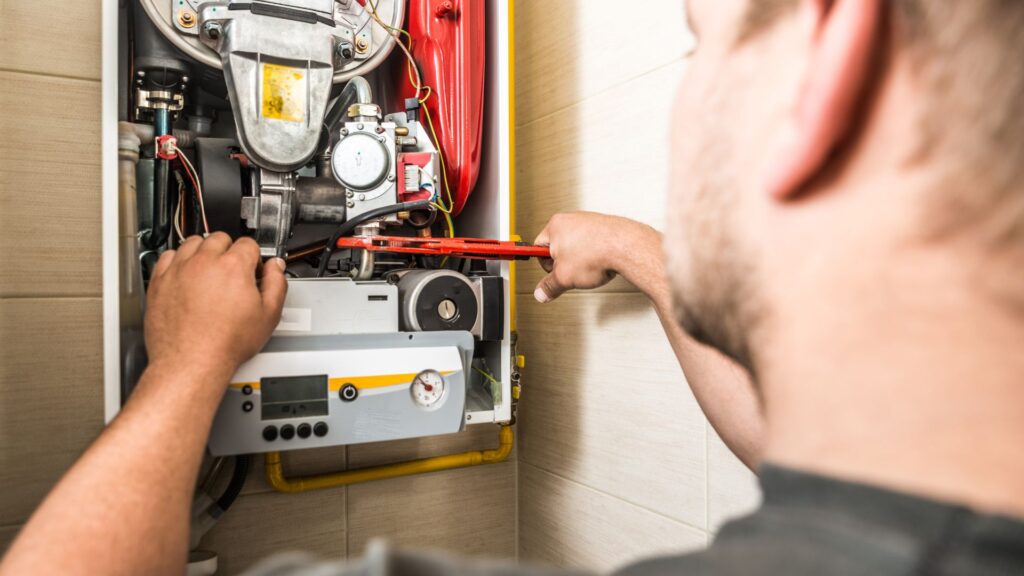What Is a Maintenance Technician? Essential Roles & Skills Explained

A maintenance technician ensures buildings, equipment, and systems run smoothly. They troubleshoot, repair, and perform preventive maintenance to keep operations efficient. In this article, we’ll explore what maintenance technician’s key responsibilities are, what maintenance technician’s necessary skills, educational pathways, career opportunities, and tips for pursuing this career. Additionally, we will answer the question. What is a maintenance technician?
Key Takeaways
- A maintenance technician is vital for ensuring the operational efficiency of buildings, equipment, and systems across various industries through routine maintenance, emergency repairs, and preventative measures.
- Essential skills for maintenance technicians include a mix of technical expertise in mechanical and electrical systems, along with soft skills such as communication, problem-solving, and time management.
- Career advancement opportunities for maintenance technicians are promising, often leading to managerial roles, with competitive salaries influenced by experience, specialization, and geographical location.
Understanding the Role of a Maintenance Technician

A maintenance technician is a skilled worker responsible for the upkeep and repair of buildings, grounds, and machinery to ensure seamless operations. Maintenance technicians are pivotal in ensuring continuity within diverse settings such as industrial plants, corporate offices, residential properties.
The diverse range of tasks encompassed by a maintenance technician’s job description is a key factor in its widespread appeal. These professionals find opportunities across numerous industries, including industrial maintenance, property management, aviation, construction, retail, and healthcare. This broad applicability not only enriches their daily work but also offers a variety of career prospects.
Maintenance technicians tackle numerous challenges, such as diagnosing and repairing issues with mechanical or electrical systems, conducting regular inspections, and implementing preventive measures. Their primary goal is to maintain all systems in optimal condition, preventing any disruptions or halts in workflow. Many find satisfaction in this role due to the gratification that comes from fixing defects and solving technical problems inherent in maintenance work.
Consider the complexities involved in managing critical infrastructures like HVAC units, ventilation systems, and intricate electrical grids. These elements are crucial for the continuous operation of facilities, and this is where maintenance technicians excel. They ensure these systems function smoothly, preventing costly downtimes. Beyond immediate repairs, maintenance technicians are essential because they help prevent issues before they arise, making them indispensable to any organization.
Key Responsibilities of a Maintenance Technician

Maintenance technicians are tasked with a wide range of duties that contribute to the uninterrupted functioning of facilities and machinery. They engage in routine maintenance activities, tackle emergency repairs, and carry out preventive actions—all essential for sustaining operational effectiveness and reducing periods when equipment is not working.
The roles they play can be detailed into specific tasks:
Routine Maintenance Activities
Maintenance technicians are primarily engaged in routine maintenance activities, which are essential for the uninterrupted and efficient operation of equipment and systems. Maintenance tasks regularly involve overseeing the proper functioning of various systems including plumbing, HVAC, and electrical systems within buildings to guarantee their effectiveness.
It is vital that these professionals maintain current records of all maintenance work performed—particularly within regulated environments. Accurate maintenance documentation helps monitor the entirety of conducted activities and certifies adherence to compliance standards.
Emergency Maintenance Tasks
Maintenance technicians are swiftly called upon to tackle sudden equipment malfunctions, performing emergency maintenance that is vital for getting systems back online and reducing idle time. They carry out diagnostic tests to identify the sources of problems and expedite the repair process. The proficiency of these technicians in diagnosing and resolving issues promptly guarantees that normal operations can resume with little interruption.
Preventative Maintenance
Anticipating and forestalling issues before they arise is the essence of preventative maintenance. To guarantee the dependability and operability of equipment, maintenance technicians execute regular inspections and upkeep checks. It’s vital that they maintain thorough records to monitor these procedures accurately, which also aids in adhering to outside manufacturing standards. This thoroughness ensures that maintenance documentation can be understood effectively by the technicians.
Technicians aim to avoid unexpected failures and preserve seamless operations by proactively addressing possible complications.
Skills Required for Maintenance Technicians

Succeeding as a maintenance technician requires a combination of specialized technical abilities and interpersonal skills. This set of competencies enables maintenance technicians to adeptly navigate the myriad tasks they encounter, ranging from intricate technical problems to fostering productive communication among members of a maintenance team.
A deeper examination into these requisite skills is warranted.
Technical Skills
Expertise in technical skills is pivotal for the proficiency of a maintenance technician. These experts require comprehensive insight into mechanical, hydraulic, pneumatic, and electrical systems. A proficient understanding of programmable logic controllers (PLCs) along with other contemporary technologies is equally imperative. It’s essential that maintenance technicians excel at diagnosing problems and executing repairs across diverse systems to maintain their seamless and effective operation.
To be an exceptional maintenance technician necessitates keeping pace with cutting-edge technological developments. This flexibility remains critical as both the tools and methods employed in upkeep are subject to continuous refinement.
It’s paramount for these professionals to have a firm grasp on fundamental operational concepts and adhere strictly to safety protocols while carrying out their responsibilities effectively and without risks.
Soft Skills
For maintenance technicians, having strong technical abilities is imperative, but the importance of soft skills cannot be overlooked. The capacity to communicate effectively allows these technicians not only to relay information with clarity, but also fosters robust connections within their own maintenance team and across different departments. Possessing adept problem-solving capabilities is vital for swift diagnosis and rectification of problems while being proficient in time management ensures that assignments are accomplished on schedule.
The role a technician plays can be greatly enhanced by manual dexterity as well as an innate grasp of various systems at play. These soft skills – often less tangible than hard skills – are indispensable elements for fostering a cohesive and efficient workplace atmosphere. Collectively, this blend of talents empowers maintenance technicians to excel in their duties and make substantial contributions within their respective organizations.
Educational Pathways and Training

Pursuing a career as a maintenance technician demands a strong base in education and an ongoing commitment to learning. There are multiple routes one can take to gain the essential expertise, ranging from completing high school to engaging in vocational programs and accumulating hands-on experience.
It is important to delve deeper into these educational options to fully understand the avenues available for acquiring the skills required to become a proficient maintenance technician.
High School Diploma and Basic Education
To embark on a career as a maintenance technician, obtaining a high school diploma or its equivalent is usually the initial requirement. Such an education lays the groundwork for securing entry-level roles in this field. Gaining competencies in areas such as mathematics, physics, and fundamental computer skills can be especially advantageous.
It’s important to develop expertise in managing Computerized Maintenance Management Systems (CMMS), which are essential for coordinating and organizing maintenance activities effectively.
Vocational Training and Certifications
For those seeking to become maintenance technicians, obtaining vocational training programs and certifications is critical for improving their job prospects and career advancement. Local technical colleges offer targeted technical training, which encompasses subjects like automation and electro-mechanical systems. These programs deliver hands-on education in industrial systems and machinery.
Earning credentials such as the Certified Maintenance and Reliability Technician or the Certificate for Apartment Maintenance Technician can substantially enhance a technician’s professional profile. These qualifications not only affirm a technician’s competencies, but also indicate their dedication to ongoing professional growth. In industries with rigorous demands like pharmaceuticals, it is common that maintenance technicians must adhere closely to strict safety protocols and standards.
Apprenticeships and On-the-Job Training
Apprenticeships and practical learning experiences are crucial for maintenance technicians, as they provide the essential hands-on experience required in this field. By participating in apprenticeship programs, these technicians have the opportunity to develop their skills under the mentorship of seasoned professionals.
This type of on-the-job training is an effective pathway toward securing entry-level roles within the industry and ensures that individuals are well-prepared with proficiency in their job functions. Job seekers can locate such opportunities on employment agencies such as OnSite Property Solutions.
Career Opportunities and Work Environments

Maintenance technicians are presented with a wide array of career paths across different sectors and work settings. Their vital contribution to the efficient functioning of equipment and systems greatly influences productivity levels. They are sought after in various organizations, ranging from sizable corporations to small enterprises, as well as niche fields such as healthcare and manufacturing.
The scope for these career opportunities warrants deeper exploration.
Industrial Maintenance
Maintenance technicians play a pivotal role in the environment of manufacturing processes, where they are responsible for enhancing the operational availability of machinery and facilitating uninterrupted production flows. They undertake various tasks such as installing, purifying, oiling, and initiating equipment operations. A skilled crew is imperative to manage an efficient factory setting, with the industrial maintenance technician being an integral component of that team.
An individual working as a maintenance technician within an industrial setting needs to be proficient in resolving mechanical or electrical issues while conducting routine inspections and adhering to standards set by external manufacturing regulations. Given their extensive knowledge and experience with day-to-day duties, it’s common for these technicians to advance into supervisory roles overseeing maintenance activities.
The domain of industrial maintenance presents ample employment prospects for those equipped with proper technical know-how and vocational preparation.
Building Maintenance
Maintenance technicians specializing in building upkeep are tasked with preserving the operational integrity of various systems within a facility, which includes plumbing, heating, ventilation and air conditioning (HVAC), as well as electrical systems. They carry out routine maintenance activities and perform preventative checks to prevent the need for significant repairs. These professionals collaborate closely with the building supervisor to ensure that the property remains in optimal condition and operates efficiently.
When problems arise, it’s crucial for these technicians to address them promptly in order to reduce any disruptions and keep occupants content. Part of their duty involves keeping detailed records of maintenance work performed on the premises to comply with regulations and aid in monitoring upkeep efforts.
Pursuing a career in building maintenance can provide a solid foundation for employment stability along with opportunities for advancement and specialization within this field.
Read more: What Role Does a Maintenance Technician Play?
Advancement and Salary Potential
The job outlook for maintenance technicians is promising, offering a wealth of advancement opportunities and attractive pay. The need for proficient maintenance technicians is anticipated to increase as automation becomes more prevalent in various industries.
Exploring the potential career trajectories and projected earnings within this field reveals that there are significant prospects worth considering.
Advancement from Technician to Manager
Career growth for maintenance technicians frequently culminates in ascending to managerial positions like building supervisor or maintenance manager. Pursuing Training and securing certifications, although not mandatory, can aid in career progression. Those maintenance technicians who exhibit robust technical skills coupled with leadership prowess have the potential to move up to supervisory roles where they are responsible for managing teams and directing maintenance activities.
While obtaining a certificate or credential might be instrumental in advancing within the field of maintenance technician, the practical experience acquired from on-the-job training is just as critical. Stepping into these higher-level positions entails taking on more responsibilities and often leads to an increase in earning capacity, which serves as a compelling incentive for committed professionals aiming at such ambitious professional milestones.
Salary Expectations
Maintenance technicians are compensated with salaries that align with their expertise and work history. Those in entry-level positions often see hourly earnings ranging from $15 to $22. Yet, as they advance in experience and develop specializations, these professionals have the potential to make over $70,000 per year. A technician’s pay is largely influenced by factors including geographic location, accumulated experience, and specialized knowledge.
With the accumulation of greater experience and a willingness to undertake more responsibilities comes the opportunity for maintenance technicians to elevate their earning prospects. Their prowess in technical skills coupled with proficiency in resolving complex maintenance issues render them invaluable assets within their field—a reality that can be reflected through progressive salary enhancements as time goes on.
How to Prepare for a Maintenance Technician Career
Embarking on a path to become a maintenance technician requires the cultivation of specialized technical abilities and interpersonal skills, along with accruing pertinent hands-on experience. The capacity for resilience plays a key role in handling the pressures associated with unexpected maintenance crises, and ongoing skill enhancement is essential for professional growth.
Below are some actionable recommendations to guide you in your initial journey.
Building a Strong Resume
To differentiate yourself in the employment landscape, having an impactful resume is crucial. Emphasize your experience and capabilities that correspond with what is sought after for a position as a maintenance technician. Modify your resume to echo the terminology found in job postings, emphasizing any practical training engagements like apprenticeships or opportunities where you observed professionals on the job.
Take advantage of top-tier resume writing services and advice from mentors to polish your professional profile.
Preparing for Interviews
It’s essential to hone your interview preparation to ensure you can convey your qualifications and suitability for the position effectively. Rehearsing responses to frequently asked questions about your educational background and how you tackle problems will enable you to express your professional journey and competencies with clarity, enhancing the likelihood of a favorable outcome.
Gathering input from advisors is beneficial as it offers critical perspectives that can improve the way you approach interviews. Showcasing proficient communication skills, adeptness at managing time efficiently, and a thorough grasp of job-specific technicalities are key elements that will leave a lasting positive impact on prospective employers.
Summary
Embarking on a career as a maintenance technician offers numerous opportunities for advancement and specialization, making it an attractive and fulfilling profession. To pursue this successful path, one must grasp the duties involved, obtain the essential skills, and follow suitable educational routes. There’s increasing demand across various areas—from industrial maintenance to building upkeep or niche sectors—ensuring that skilled maintenance technicians have promising prospects in their chosen field. For those specifically interested in maintenance technician jobs in Georgia, OnSite Property Solutions provides excellent opportunities. We connect employers with qualified candidates for various roles within the property management industry, including assistant managers, leasing consultants, property accountants, property managers, and punch technicians. As a leading provider of property management services, OnSite Property Solutions is dedicated to connecting skilled technicians with top-tier job opportunities, fostering growth and career advancement in the field. Contact us to manage your hiring process.
Frequently Asked Questions
What qualifications are needed to become a maintenance technician?
To become a maintenance technician, a high school diploma or equivalent is essential, and vocational training along with relevant certifications can significantly improve job prospects.
What are the key responsibilities of a maintenance technician?
Maintenance technicians are primarily responsible for routine maintenance, emergency repairs, and preventative maintenance to ensure the efficient operation of equipment and facilities.
These responsibilities are crucial for minimizing downtime and extending the lifespan of assets.
What skills are essential for a maintenance technician?
A maintenance technician must possess technical skills in mechanical, hydraulic, pneumatic, and electrical systems, complemented by strong communication, problem-solving, and time management abilities.
These skills are vital for effective performance and ensuring operational efficiency.
What are the career advancement opportunities for maintenance technicians?
Maintenance technicians have the potential to progress into managerial positions such as maintenance manager or building supervisor. This upward career move usually requires additional training and obtaining certifications.
Taking advantage of these opportunities can result in increased duties and professional advancement.
What is the salary range for maintenance technicians?
For those starting out in entry-level positions, maintenance technicians can expect to earn between $15 and $22 per hour. Meanwhile, seasoned technicians have the potential to make over $70,000 a year.

